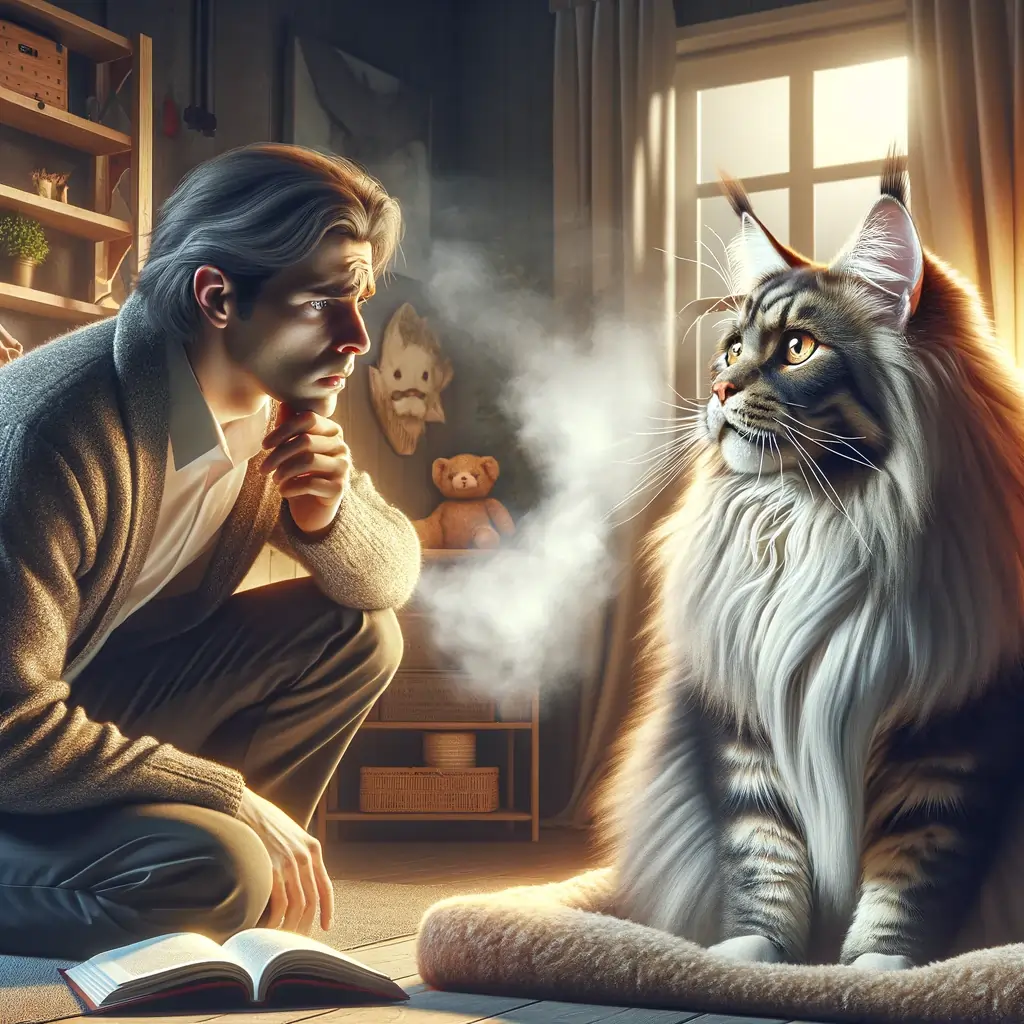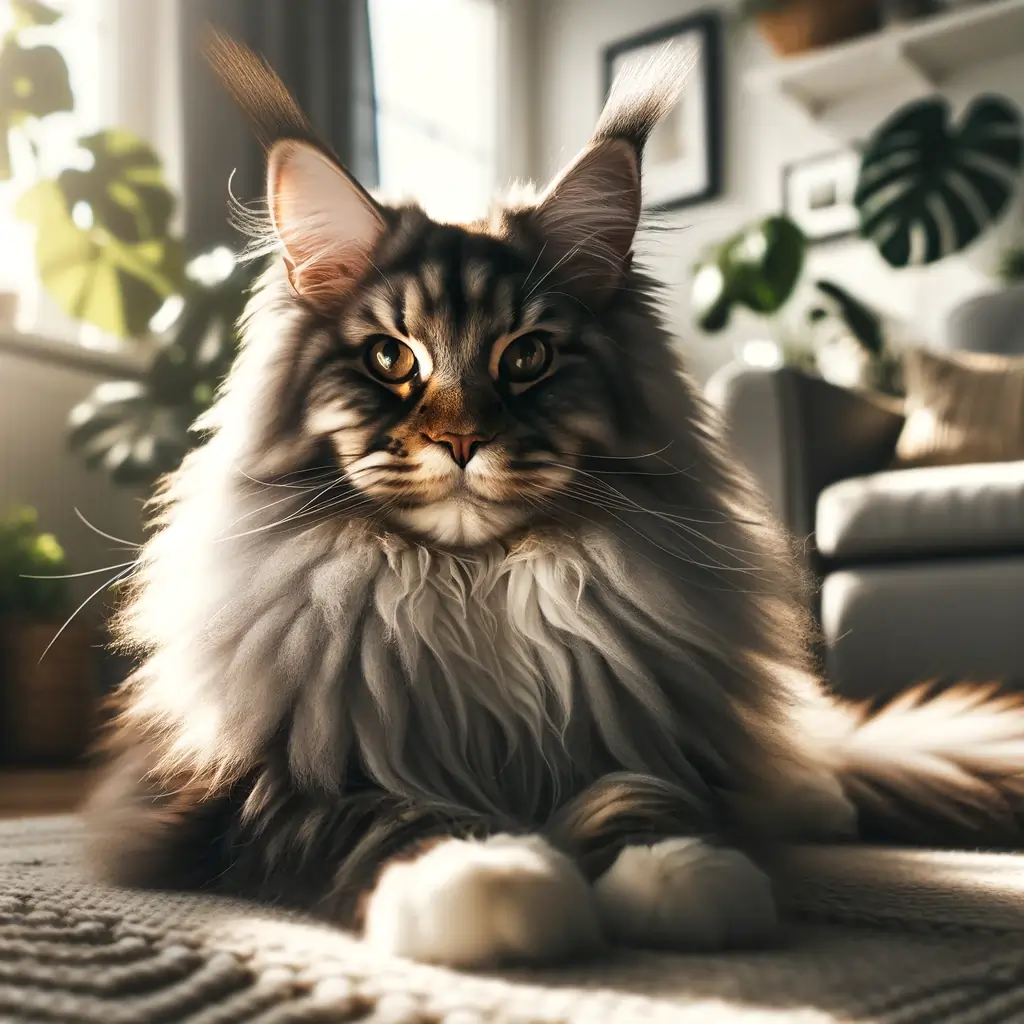Are you concerned about your Maine Coon always seeming hungry? It’s important to understand that their feeding habits may differ from other cat breeds. In this article, we will provide expert advice on feeding habits specific to Maine Coons, ensuring that your feline companion gets the right amount of food.
Understanding Maine Coon Feeding Behavior and Metabolism.
When it comes to the feeding behavior and metabolism of Maine Coon cats, understanding their unique traits is crucial for providing them with optimal nutrition. These majestic felines are known for their large size and hearty appetites, leading many owners to wonder why they always seem hungry.
Maine Coons have a high metabolism compared to other cat breeds, which means they require a larger amount of food to maintain their energy levels. This is partly due to their large size and muscular build. Additionally, their feeding behavior differs from that of other cats, further contributing to their seemingly insatiable hunger.
Unlike some cats, Maine Coons tend to graze on their food throughout the day rather than eat large meals at specific times. This is believed to be an instinctual behavior inherited from their ancestors, who had to hunt for their own food in the wild. Grazing allows Maine Coons to eat smaller portions more frequently, mimicking their natural hunting and feeding habits.
Another factor that influences the feeding behavior of Maine Coons is their specific dietary needs. These cats require a well-balanced diet that includes high-quality proteins, fats, and carbohydrates. Their large size also means they need a sufficient amount of calories to support their energy requirements and maintain a healthy weight.
Understanding the feeding behavior and metabolism of Maine Coon cats is essential for keeping them healthy and satisfied. By providing them with appropriate portion sizes and high-quality food, you can ensure they receive the nutrients they need to thrive. Next, we will explore healthy feeding practices specifically tailored for Maine Coons to help you meet their nutritional needs effectively.
Healthy Feeding Practices for Your Maine Coon.
When it comes to feeding your Maine Coon cat, it’s important to establish healthy feeding practices that cater to their unique needs. By ensuring they receive a balanced diet and appropriate portion sizes, you can help maintain their overall health and prevent weight-related issues.
Feeding Frequency
Maine Coons have a high metabolism and may require more frequent meals compared to other cat breeds. It is recommended to feed them multiple small meals throughout the day rather than one or two large meals. This helps prevent them from feeling constantly hungry and promotes better digestion.
Portion Sizes
It’s essential to provide Maine Coons with appropriate portion sizes to prevent overeating and weight gain. Consult with your veterinarian to determine the right amount of food based on their age, activity level, and overall health. Avoid free-feeding, as it can lead to excessive calorie intake and obesity.
Importance of High-Quality Food
Choosing high-quality cat food is crucial for the health of your Maine Coon. Look for formulas that are specifically formulated for large or giant breed cats, as they contain the necessary nutrients to support their growth and development. Avoid foods with excessive fillers, artificial additives, and low-quality protein sources.

| Feeding Practices | Benefits |
|---|---|
| Provide fresh water at all times | Prevents dehydration and aids digestion |
| Feed a combination of wet and dry food | Ensures a balanced diet and helps maintain dental health |
| Avoid feeding table scraps or human food | Prevents nutritional imbalances and potential toxicity |
| Consider incorporating puzzle feeders or food toys | Provides mental stimulation and prevents rapid eating |
Preventing Overeating
Maine Coons have a hearty appetite, but it’s important to prevent them from overeating. Monitor their food intake and body condition regularly to ensure they are maintaining a healthy weight. If you have concerns about your cat’s eating habits or weight, consult with your veterinarian for personalized advice.
By following these healthy feeding practices, you can provide your Maine Coon with the nutritional support they need to thrive. Remember, every cat is unique, so it’s essential to tailor their diet to meet their individual requirements.
Conclusion.
In conclusion, understanding your Maine Coon’s feeding habits is crucial for their overall health and well-being. As we discussed, Maine Coons are known for always being hungry due to their high metabolism and specific dietary needs. It is important to provide them with a balanced diet and the right amount of food to keep them satisfied.
By following healthy feeding practices such as feeding frequency, portion control, and ensuring high-quality food, you can help prevent overeating and maintain a healthy weight for your Maine Coon. Additionally, monitoring their eating habits and consulting with a veterinarian if you have any concerns is essential in addressing any underlying health issues.
Remember, Maine Coons have unique feeding behaviors that may differ from other cat breeds. Being aware of their constant hunger and implementing appropriate feeding practices will contribute to their overall happiness and well-being. By taking care of their nutritional needs, you can ensure that your furry friend remains healthy and satisfied.
FAQs
Q: Why is my Maine Coon kitten always hungry?
A: Maine Coon kittens, like many other cats, have high metabolisms and burn more calories than other breeds. This can lead to them constantly feeling hungry and wanting to eat more frequently.
Q: How can I make sure my cat is getting enough food?
A: Ensure you are offering your Maine Coon kitten high-quality food in appropriate portions throughout the day. Monitor their weight and consult your vet for personalized feeding advice.
Q: Are there any health problems that could cause my cat to always be hungry?
A: Health conditions such as hyperthyroidism or worms can increase your cat’s appetite. If you suspect any underlying issues, it’s best to seek advice from a veterinarian.
Q: Could boredom be making my cat seem hungrier than usual?
A: Yes, Maine Coon cats are playful and intelligent creatures. Providing mental stimulation and interactive playtime can help alleviate boredom-induced eating habits.
Q: What should I do if my cat is constantly begging for food?
A: Try distracting them with toys or engaging activities when they beg for food outside of their regular mealtimes. Reinforce positive behavior with treats and attention.
Q: My cat is eating too quickly and then vomiting. What should I do?
A: Consider using puzzle feeders or slow feed bowls to help slow down your cat’s eating pace. If vomiting persists, consult your vet to rule out any underlying health issues.
Q: How can I ensure my Maine Coon kitten is getting the right nutrients?
A: Offer a balanced diet of wet and dry food designed for kittens. Consult with your veterinarian to determine the best feeding plan based on your cat’s individual needs.

Hey guys, My name is Simon Smith. I’m from Canada and live near Victoria
I live with my sweet family and have 20+ Ragdolls of different types. I love them as my own children. My profession is as a hotel manager.
I love to keep Ragdolls and grow their breeder case. I have 7 years of experience.
I’m an expert in cat care. So, I’m here to provide you with new information about my cats daily. This is my personal blog website, so I request that you kindly visit our site daily.
If you’re a Ragdolls lover and you have any questions or confusion about cats, text me on the Contact Us page or Gmail.
Thank u
